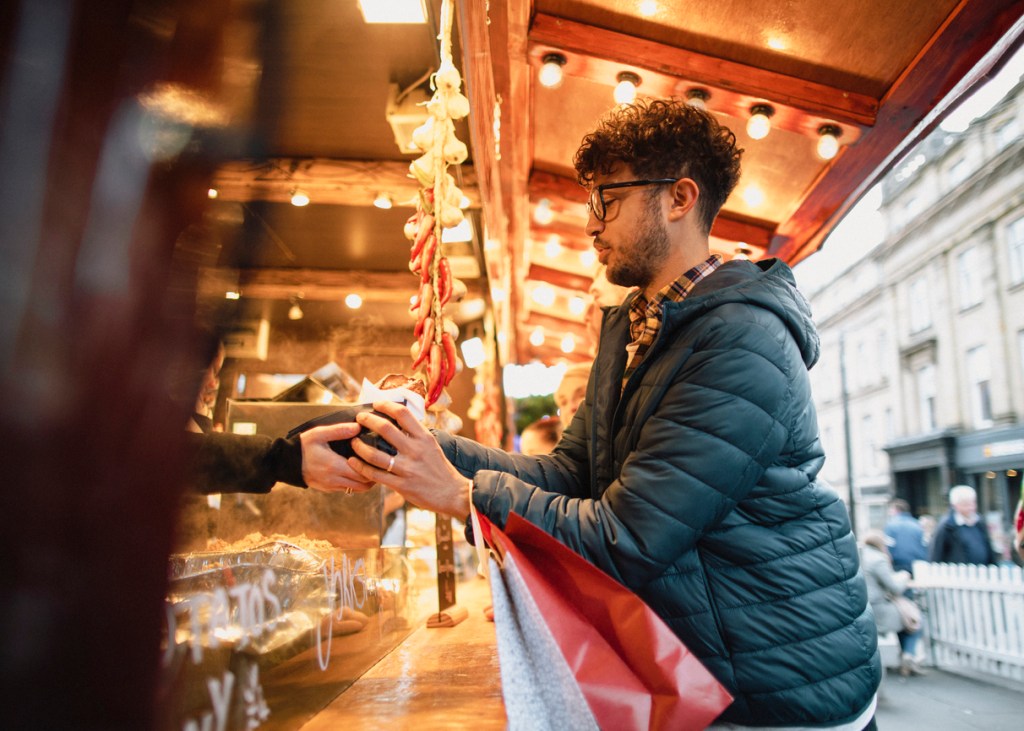How to start your own street food business

Miranda Roberts is one half of the team who set up Shrimpy. After seven years of running Shrimpy successfully, and sometimes not so successfully, she’s learned a thing or two about what can make an idea work and what can make it fail. Prior to setting up Shrimpy she developed valuable skills for street food while in restaurant management. In this article she sets out the questions you need to ask yourself before you decide to pursue your street food dreams.
Anyone can do it
Street food can encompass so many things. Depending on who you speak to, street food can be painfully cool venues with beers and neon lights, or it can be wholesome, salt-of-the-earth products on a farmers’ market, or someone selling bacon butties outside your office. It is essentially just selling food on the street but it’s the who, what, how, where and why that make it interesting and varied. There’s a spot for anyone.
Who?
- Who are you? You could be anyone; you don’t have to have fifty grand to spend on a vintage van (and it’s probably better if you don’t do that straight away anyway).
- Who are you going to work with? What does this mean for your brand? Are you using only locally sourced ingredients or are you bringing something you can’t get where you are? Who your suppliers are says a lot about your business.
What?
- What are you selling?
- What are you passionate about? Is there something you want to teach people?
- What’s missing from your neighbourhood?
- What is your USP? Start-up costs are minimal, so there’s plenty of competition out there. You need to stand out from the crowd and be the very best you can be.
- What are your skills? How do they elevate your business? There are a lot of hats to wear at the start and for quite a while after that too, so you need to be an all-rounder. You need to be able to cook, clean, chat and balance the books at the end of the day. Some of this will come naturally, other parts less so, but you’ve got to put the work in; there’s no point sticking your head in the sand because these things won’t go away.
How?
- How are you going to make money? Will you do all weekly markets? All the festivals? Are you going to do it full time or just Saturdays?
- How are you going to operate? Will you use a gazebo? A van? A trailer?
Where?
- There are myriad options: amazing food markets with flashy neon lights and loud music, farmers’ markets across the country every Saturday morning; there’s Glastonbury, the Chelsea Flower Show, weddings, train stations, churchyards, car parks, school fêtes and birthday parties in back gardens.
- Are you city-based or out in the country? If city-based you may think travelling further than ten miles is a stretch, but in the countryside you’ll be willing to go across counties in search of decent spots.
Why?
- Why are you doing this? What do you want out of it? Do you want to grow into a restaurant and set up an
empire? Do you want more control over your time? Do you just love the market around the corner from your house and want to be part of it?
You can make thousands of different businesses by choosing different criteria from these lists, and all are valid. It would not do for us all to be the same. There’s absolutely no point in having all new street-food businesses decide they need to buy the same van, get a neon sign and some branded caps and rock up at the same market. It’d be boring and actually only one of you would get a spot.
Don’t be put off by the high spec of some of the events either. Street food is about authenticity. People will buy into you as a business so much more if it’s clear where their money is going. People spend their money with small businesses for many reasons, and one of them is for the story. They can see you improve week after week. They feel like they are investing in you as a person and are on the journey with you. They can actually see the £8 they give you for their sandwich being reinvested in the business; they see you get a better gazebo, another member of staff and then better branding. People love that stuff. They don’t believe it when you start off with a branded truck worth £50,000. You might look cool but you lack the authenticity. People want to be part of your journey, they want to say, ‘I was there at the beginning.’
A few notes to start off with
- The film Chef is not a documentary. Don’t expect it to be as easy or as simple as Jon Favreau makes it look.
- Just because you went on holiday somewhere once does not mean you are entitled to make money by selling food from that country. Do you not think that maybe someone else would be better at it? Take inspiration, sure. We all have to get ideas from somewhere, but don’t have the stall set up with flags and national dress and the words ‘authentic’ all over the menu when really you’ve spent more of your life in Tesco than the place you’re selling ‘authentic’ food from.
- Don’t be fooled by the long queues. Think about it sensibly: for every lovely spring day, there are three horrific winter shifts where your feet are soaked from morning through to closing, and you just manage to cover your costs if you’re lucky. Don’t think the path is paved with gold; there’s money to be made, but it’s certainly not a way to get rich quick.
-
So you want to set up a food business? You want to be your own boss, show off your skills and have an adventure?
Street food is the best place to start. It is delicious and fun, well-paid and life-affirming, offering pure freedom and a chance to develop a real obsession with the weather forecast. It can also be hand-to-mouth, heartbreaking, soul-destroying and heavy manual labour - but more on that later.
Delicious Freedom is a guide for anyone thinking about setting up their own street food business, for those who don't have the time or inclination to read a dull tome on business strategy. It is the book Miranda Roberts wishes had existed seven years ago when she started her street food adventure, and one which many people are searching for.
It provides tangible advice from what you will sell to where will you do it and to whom. Throughout the book you will find stories from those who have tried and succeeded as well as those who have tried and failed, what they've all learnt and why they did it.
This accessible book encompasses all the highs and lows of running your own business, and provides an insight into one of the most exciting sectors of the hospitality industry.








